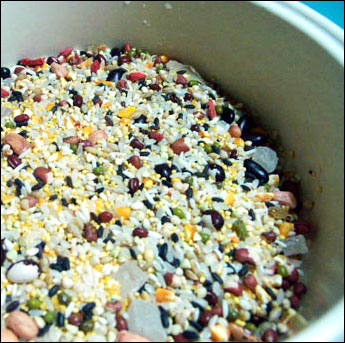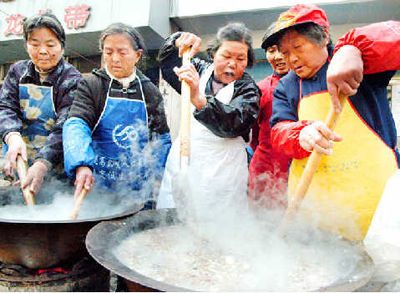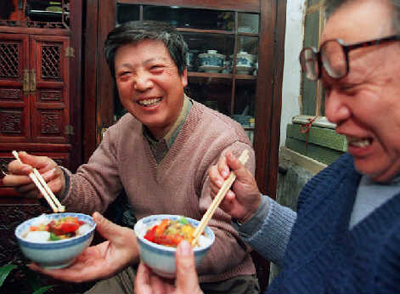| Home / Spring Festival 2007 / Related Festivals | Tools: Save | Print | E-mail | Most Read |
| Laba Festival: Holiday Spirit Fills the Land |
| Adjust font size: |
This holiday may be traced back to the ancient Chinese custom of sacrificing game to the ancestors during the last month of the lunar year. Following the ritual, the participants feasted together on the sacrificial meat in an early expression of the Chinese tradition of communal eating. The Laba Festival is popularly referred to as Laji Festival (End-of-Year Sacrifice Festival), another indication of its ancient origins and association with early sacrificial rituals. It is also said that Sakyamuni Buddha attained enlightenment on the eighth day of the twelfth lunar month. As a result, with the introduction of Buddhism to China, the Laba Festival also became known as the Day of Enlightenment. Eating porridge on the Laba Festival is a very old tradition. As Buddhism became integrated into Chinese society, "Laba porridge" became known as "Buddha porridge," in commemoration of the date of Buddha's enlightenment. Legend has it that after Sakyamuni left secular life to become a monk, he meditated so deeply that he often forgot to eat. Once, when he was close to dying of starvation, he encountered a woman tending her flock. The woman saved his life by feeding him rice porridge with milk, enabling him to continue meditating and attain enlightenment on the day of Laba Festival. In order to commemorate this incident, every year at the Laba Festival Buddhists eat Laba porridge, also known as Buddha porridge. Many versions of the legends concerning the origins of Laba Festival exist in different regions of China. The two most important traditions associated with Laba Festival are eating Laba porridge, and praying for peace and good health in the coming year. Virtually every household in China eats Laba porridge on the eighth day of the twelfth lunar month. Filled with nuts and dried fruit, today's Laba porridge is both tastier and more appealing to the eye than the "Buddha porridge" of the past. Today, Laba porridge serves as a symbol of good fortune, long life, and fruitful harvest. The custom of eating Laba porridge is not only an expression of respect for Buddha and the ancestral spirits. Laba porridge is also a very nourishing and healthful food. In his encyclopedic classic of herbal medicine Bencao Gangmu (Compendium of Materia Medica), eminent Ming Dynasty physician Li Shizhen states that rice porridge "increases the life force, produces saliva, nourishes the spleen and stomach, and resolves sweating due to weak constitution or health." Eating Laba porridge is a distinctive and popular tradition of the Laba Festival. Buddhist tradition equates porridge with good fortune. Friends, family, and neighbors customarily exchange gifts of Laba porridge to express good wishes. In the past, devout Buddhists presented gifts of Laba porridge to the emperor and local officials. It can be seen that Laba porridge was a favorite holiday gift not only among the rulers and bureaucracy of feudal China, but also in every strata of society. Laba Festival falls during the depths of winter, which made it an ideal season for storing food. The harvest is in, and people can turn their attention to preparing and enjoying a wide array of delicious dishes. In addition to Laba porridge, many different types of pickled vegetables and special dishes are popular during Laba Festival, including garlic pickled in vinegar and pickled Chinese cabbage. In northern Shaanxi Province, it is obligatory to eat Laba noodle soup, made with eight different shredded ingredients. In the Tongguan-Lintong region of Shaanxi Province, Laba noodle soup is made with hot chili peppers. Hot Laba wine is popular all over China during Laba Festival.
(China.org.cn February 13, 2007) |
| Tools: Save | Print | E-mail | Most Read |
 |
| Related Stories |



